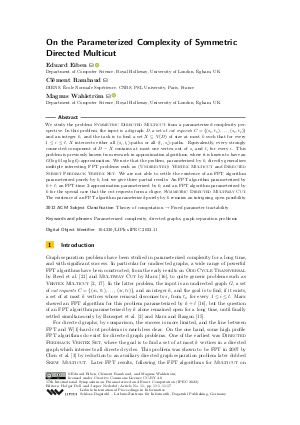On the Parameterized Complexity of Symmetric Directed Multicut
Authors
Eduard Eiben  ,
Clément Rambaud,
Magnus Wahlström
,
Clément Rambaud,
Magnus Wahlström 
-
Part of:
Volume:
17th International Symposium on Parameterized and Exact Computation (IPEC 2022)
Part of: Series: Leibniz International Proceedings in Informatics (LIPIcs)
Part of: Conference: International Symposium on Parameterized and Exact Computation (IPEC) - License:
 Creative Commons Attribution 4.0 International license
Creative Commons Attribution 4.0 International license
- Publication Date: 2022-12-14
File

PDF
LIPIcs.IPEC.2022.11.pdf
- Filesize: 0.76 MB
- 17 pages
Document Identifiers
Subject Classification
ACM Subject Classification
- Theory of computation → Fixed parameter tractability
Keywords
- Parameterized complexity
- directed graphs
- graph separation problems
Metrics
- Access Statistics
-
Total Accesses (updated on a weekly basis)
0Document
0Metadata
Abstract
We study the problem Symmetric Directed Multicut from a parameterized complexity perspective. In this problem, the input is a digraph D, a set of cut requests C = {(s₁,t₁),…,(s_l,t_l)} and an integer k, and the task is to find a set X ⊆ V(D) of size at most k such that for every 1 ≤ i ≤ l, X intersects either all (s_i,t_i)-paths or all (t_i,s_i)-paths. Equivalently, every strongly connected component of D-X contains at most one vertex out of s_i and t_i for every i. This problem is previously known from research in approximation algorithms, where it is known to have an O(log k log log k)-approximation. We note that the problem, parameterized by k, directly generalizes multiple interesting FPT problems such as (Undirected) Vertex Multicut and Directed Subset Feedback Vertex Set. We are not able to settle the existence of an FPT algorithm parameterized purely by k, but we give three partial results: An FPT algorithm parameterized by k+l; an FPT-time 2-approximation parameterized by k; and an FPT algorithm parameterized by k for the special case that the cut requests form a clique, Symmetric Directed Multiway Cut. The existence of an FPT algorithm parameterized purely by k remains an intriguing open possibility.
Cite As Get BibTex
Eduard Eiben, Clément Rambaud, and Magnus Wahlström. On the Parameterized Complexity of Symmetric Directed Multicut. In 17th International Symposium on Parameterized and Exact Computation (IPEC 2022). Leibniz International Proceedings in Informatics (LIPIcs), Volume 249, pp. 11:1-11:17, Schloss Dagstuhl – Leibniz-Zentrum für Informatik (2022)
https://doi.org/10.4230/LIPIcs.IPEC.2022.11
BibTex
@InProceedings{eiben_et_al:LIPIcs.IPEC.2022.11,
author = {Eiben, Eduard and Rambaud, Cl\'{e}ment and Wahlstr\"{o}m, Magnus},
title = {{On the Parameterized Complexity of Symmetric Directed Multicut}},
booktitle = {17th International Symposium on Parameterized and Exact Computation (IPEC 2022)},
pages = {11:1--11:17},
series = {Leibniz International Proceedings in Informatics (LIPIcs)},
ISBN = {978-3-95977-260-0},
ISSN = {1868-8969},
year = {2022},
volume = {249},
editor = {Dell, Holger and Nederlof, Jesper},
publisher = {Schloss Dagstuhl -- Leibniz-Zentrum f{\"u}r Informatik},
address = {Dagstuhl, Germany},
URL = {https://drops.dagstuhl.de/entities/document/10.4230/LIPIcs.IPEC.2022.11},
URN = {urn:nbn:de:0030-drops-173679},
doi = {10.4230/LIPIcs.IPEC.2022.11},
annote = {Keywords: Parameterized complexity, directed graphs, graph separation problems}
}
Author Details
References
-
Amit Agarwal, Noga Alon, and Moses Charikar. Improved approximation for directed cut problems. In STOC, pages 671-680. ACM, 2007.

-
Nicolas Bousquet, Jean Daligault, and Stéphan Thomassé. Multicut is FPT. SIAM J. Comput., 47(1):166-207, 2018.

- Jianer Chen, Yang Liu, Songjian Lu, Barry O'Sullivan, and Igor Razgon. A fixed-parameter algorithm for the directed feedback vertex set problem. J. ACM, 55(5), 2008. URL: https://doi.org/10.1145/1411509.1411511.
-
Joseph Cheriyan, Howard J. Karloff, and Yuval Rabani. Approximating directed multicuts. Comb., 25(3):251-269, 2005.

-
Rajesh Hemant Chitnis, Marek Cygan, Mohammad Taghi Hajiaghayi, and Dániel Marx. Directed subset feedback vertex set is fixed-parameter tractable. ACM Trans. Algorithms, 11(4):28:1-28:28, 2015.

-
Rajesh Hemant Chitnis, MohammadTaghi Hajiaghayi, and Dániel Marx. Fixed-parameter tractability of directed multiway cut parameterized by the size of the cutset. SIAM J. Comput., 42(4):1674-1696, 2013.

-
Julia Chuzhoy and Sanjeev Khanna. Polynomial flow-cut gaps and hardness of directed cut problems. J. ACM, 56(2):6:1-6:28, 2009.

-
Marek Cygan, Fedor V Fomin, Łukasz Kowalik, Daniel Lokshtanov, Dániel Marx, Marcin Pilipczuk, Michał Pilipczuk, and Saket Saurabh. Parameterized algorithms, volume 5. Springer, 2015.

-
Guy Even, Joseph Naor, Satish Rao, and Baruch Schieber. Divide-and-conquer approximation algorithms via spreading metrics. J. ACM, 47(4):585-616, 2000.

-
Anupam Gupta. Improved results for directed multicut. In SODA, pages 454-455. ACM/SIAM, 2003.

-
Eun Jung Kim, Stefan Kratsch, Marcin Pilipczuk, and Magnus Wahlström. Directed flow-augmentation. In STOC, pages 938-947. ACM, 2022.

-
Philip N. Klein, Serge A. Plotkin, Satish Rao, and Éva Tardos. Approximation algorithms for steiner and directed multicuts. J. Algorithms, 22(2):241-269, 1997.

-
Stefan Kratsch, Marcin Pilipczuk, Michal Pilipczuk, and Magnus Wahlström. Fixed-parameter tractability of multicut in directed acyclic graphs. SIAM J. Discret. Math., 29(1):122-144, 2015.

-
Daniel Lokshtanov, M. S. Ramanujan, Saket Saurabh, and Meirav Zehavi. Parameterized complexity and approximability of directed odd cycle transversal. In SODA, pages 2181-2200. SIAM, 2020.

-
Dániel Marx and Igor Razgon. Fixed-parameter tractability of multicut parameterized by the size of the cutset. SIAM J. Comput., 43(2):355-388, 2014.

- Dániel Marx. Parameterized graph separation problems. Theoretical Computer Science, 351(3):394-406, 2006. Parameterized and Exact Computation. URL: https://doi.org/10.1016/j.tcs.2005.10.007.
- Dániel Marx and Igor Razgon. Fixed-parameter tractability of multicut parameterized by the size of the cutset, 2013. URL: http://arxiv.org/abs/1010.3633.
-
Moni Naor, Leonard J. Schulman, and Aravind Srinivasan. Splitters and near-optimal derandomization. In FOCS, pages 182-191. IEEE Computer Society, 1995.

- Marcin Pilipczuk and Magnus Wahlström. Directed multicut is W[1]-hard, even for four terminal pairs. ACM Trans. Comput. Theory, 10(3):13:1-13:18, 2018. URL: https://doi.org/10.1145/3201775.
-
M. S. Ramanujan and Saket Saurabh. Linear-time parameterized algorithms via skew-symmetric multicuts. ACM Trans. Algorithms, 13(4):46:1-46:25, 2017.

- Bruce A. Reed, Kaleigh Smith, and Adrian Vetta. Finding odd cycle transversals. Oper. Res. Lett., 32(4):299-301, 2004. URL: https://doi.org/10.1016/j.orl.2003.10.009.
